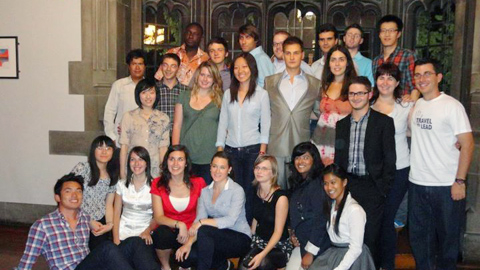
Ray Chen (CompE 1T3 +PEY) has a lofty goal: he wants engineering students to enter the workforce with more than just technical knowledge, but the communication and leadership skills necessary for them to succeed.
In order to do that, he and a team of dedicated volunteers have created the Leadership Summer School that he hopes will help students, like him, become true leaders in their field.
From Aug. 21 to 27, U of T Engineering hosted the elite Canadian Federation of Engineering Students (CFES) program, which included 21 participants from 14 countries around the world.
Engineering students from as far away as Mexico and Belgium took part in the new professional development program, which will give youth a head start in the working world.
The CFES summer initiative, the first of its kind in Canada, selected only a couple dozen engineering students to take part in the sessions. It brought students and others from professionally related organizations together on the University’s St. George Campus to share lessons and tips in an interactive environment. Five experienced international trainers also helped the future leaders learn more about best practices and leadership opportunities.
“People really brought international experiences with them when they came,” he said, “and when you have so many people sharing their strengths and advice in one place, it creates stronger engineers.”
Classes ranging from Life Planning (how students can prepare for their careers and achieve personal goals) to Emotional Intelligence (which lays out how engineers can approach stressful situations and understand emotional behaviors in a team) were covered.
Besides the obvious benefits of hosting an event of this nature it also served as a meet-and-greet for participants and strengthened relations between different institutions.
“These days engineers travel all over the world and it makes sense that we create essential dialogue with our peers wherever they live,” said Chen, who is currently studying political sciences and economics at Sciences Po Paris overseas.
Although capacity at the conference was limited, the knowledge students gained was still shared with fellow students, student groups in their home institutions.
“Physically only 24 people can attend, but [the participants] go back and develop the skills the learned and share them with their student groups and peers,” he said. “Students can still be a part of the program even if they’re not in room with us, that is why it’s so interesting.”
During the seven-day event, youth also had the opportunity to open up about ways students are falling short communication-wise and what can be done at their respective universities to expand upon their leadership knowledge –- a skill Chen confesses many students lack.
“We’ve heard from employers that students have the technical knowledge but not necessarily the communication skills so I decided to create this event where people can learn.”
He realizes that in order for U of T and international engineering students to make their mark in the world they need to learn how to better communicate their ideas.
“You have the technical knowledge, but what are you going to do with it? We want to help others prepare for the world outside of university where they’ll need communication skills, too. Knowing what you’re doing is only half the battle,” he said, ” the other half is helping others understand it.”



